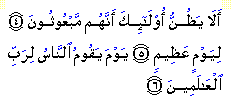Al-Mutaffifeen
(The Misers)
Chapter 83: Verses 4-6
 The
Miser The
Miser
"Do such men not think that they will
be raised to life on a great day, the day when all mankind shall stand
before the Lord of all creation?"
The fact that the behaviour of the defrauders is tackled in this manner
in a Makkan revelation is very interesting. Makkan surahs generally concentrate
on the fundamentals, such as the assertion of the unity of Allah, the
supremacy of His will and His dominion over the universe and over mankind,
and the assertion of the truth of revelation and prophethood, the truth
of the Day of Judgement, the reckoning and the reward. The tackling of
a specific issue of morality, such as the stinting of weights and measures,
or business dealings in general, is a later concern; it is characteristic
of Medinan revelations, which regulate the life of the community in an
Islamic state. The fact that this Makkan surah makes the issue of stinting
its focal point therefore deserves to be considered carefully.
The text suggests that the defrauders against whom war was declared belonged
to the nobility and wielded much power and influence which enabled them
to force others to succumb to their wishes. The Arabic expression connotes
that for some unspecified reason they were able to impose their will and
exact in full. The meaning implied is not that they exacted their full
due; for this would not justify the declaration of war against them. What
is meant is that they obtained by sheer force what they had no right to
demand. But when it was their turn to weigh or measure for others, they
exercised their power by giving them less than their due.
Indeed this warning, coming so early in the Makkan period, gives an idea
of the nature of the religion of Islam. It points out that Islam embraces
all sides of life and aims to establish a firm moral code which accords
with the basic principles of the Divine teachings. It declared war against
the misers and threatened them with woe and destruction at the time when
they were the powerful rulers of Makka. It declared its uncompromising
stand against the injustice suffered by the masses whom it has never sought
to lull into a state of lethargy and apathy. This gives us an insight
into the real motives behind the stubborn opposition to Islam by the masters
of Makka. They were undoubtedly keenly aware that what Muhammad (peace
be on him) was calling for was not merely a matter of personal conviction
which demanded no more than a verbal assertion of the unity of Allah and
the prophethood of Muhammad, and a form of prayers addressed to Allah
and not to idols. They realised that the new faith would establish a way
of life which would cause the very basis of their positions and interests
to crumble. They were fully aware that the new religion, by its very nature,
did not admit any partnership or compromise with any worldly concepts,
alien to its Divine basis, and that it posed a mighty threat to all the
base earthly values of Ignorance. This is why they launched their offensive,
which continued in full force both before and after the Muslim emigration.
It was an offensive launched to defend their way of life in its entirety,
not only a set of concepts which have no effect beyond individual acceptance
and personal conviction.
Those who attempt in any age or land to prevent it from organising and
ruling human life also realise these essential facts. They know very well
that the pure and straightforward Islamic way of life endangers their
unjust order, interests, hollow structure and deviant practices. Indeed
the tyrannical misers (whatever form their stinting takes and wherever
it is, in money and finance, or in the area of rights and duties) are
those who fear most the ascendancy of Islam and the implementation of
its just methods.
Their attitude is singularly strange. The mere idea of being raised to
life again on that great day, when all mankind shall stand as ordinary
individuals in front of the Lord of the Universe, awaiting His just judgement,
without support from any quarter, should be enough to make them change
course. But they persist, as if the thought of being raised to life after
death has never crossed their minds.
Source:
"In The Shade of The Quran" - Syed Qutb
|